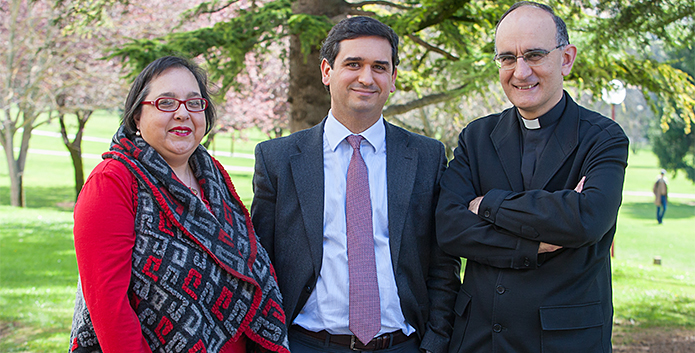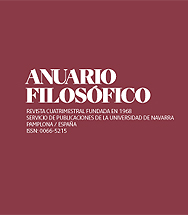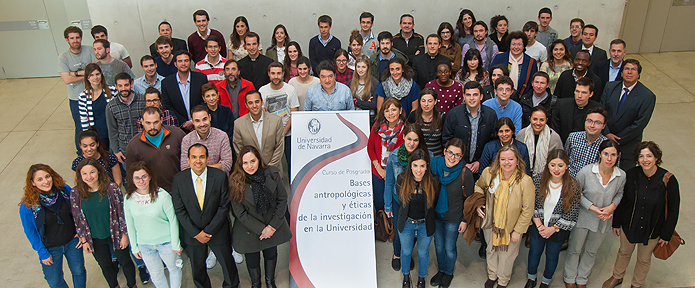LIII Philosophical Meetings: "Francisco Suárez: Scholasticism and the Modern World".
La Universidad acogerá las LIII Reuniones Filosóficas entre el 26 y 28 de abril<br><br>

Organized by the department of Philosophy of the School of Philosophy and Letters of the academic center, this International congress will bring together experts from around the world who will analyze and discuss about Francisco Suárez, considered the figure core topic to understand the transition from the medieval to the modern world.
In this interview, Professor José Ángel García Cuadrado, co-director of the Meetings, provides the keys to meeting:
This year's meetings will focus on the figure of Francisco Suárez, in the framework of the IV centenary of his death. What has his figure and thought meant in the history of the Philosophy?
Throughout the 20th century many historians of the Philosophy have highlighted the importance of Suárez's thought, first of all, of his metaphysics: for example, his great work the Metaphysical Disputations was the text of the main European Universities during the 17th and 18th centuries. The importance of his political thought is also recognized in the liberal revolutions and democratic governments of Europe and America, as well as in the declarations of human rights. On the other hand, his position on the relations between grace and freedom was the context for the disputes over determinism and freedom of the Western Philosophy from the 17th century to the present day. However, much of his work remains largely unknown. This congress aims to gain a deeper understanding of the implications of his thought for the history of ideas.
Today there is a general consensus in considering him as the figure core topic to understand the transition from the medieval to the modern world, what are the implications of this transition?
Suarez is certainly a brilliant thinker, but also a man of his time. The ideas he expounds in a profound, clear and systematic way are the reflection of a whole epoch based on philosophical categories of medieval scholasticism and their renewal by Iberian scholasticism since the 15th century. With them it has to account for the profound changes that came with Modernity. A Modernity that implies a turn towards subjectivity, mainly from the speculative point of view, but also in the field of social and political life, where awareness of individual rights begins to emerge. In addition, new scientific ideas begin to modify the vision of the world. The philosophical problems addressed by Suárez, once stripped of their scholastic garb, are tremendously topical: think, for example, of his treatise on just war. At final, to better understand Suárez is to begin to better understand the origins of our own ways of thinking.
However, the evaluation of your thinking remains very disparate, why?
Precisely his role as a hinge between medieval and modern thought makes him a polemical figure, and this to his regret, since he always shows himself to be conciliatory and prudent. For those who bet on the continuity of the medieval world, Suárez appears as a deformer of scholasticism, incorporating the subjectivist turn of Modernity; for those who consider the medieval world as a dark age, Suárez begins to be a light that will guide the steps of modern man. On the other hand, for moderns who wish to break with medieval tradition, Suárez still represents the methodological rigidity of scholasticism and medieval theocentrism. Surely all these assessments have some truth in them: that is why it is necessary to better assess both the criticisms and the praises that he has aroused throughout history.
What mark has his thinking left on today's world?
His imprint has been profound, although indirect. From the point of view of knowledge he imprints a revaluation of the active role of the subject in the knowledge, announcing the subjectivist turn of Descartes or Kant. His metaphysics opens the door to the essentialism of Leibniz and the idealism of the 19th century. In his political Philosophy , new conflicting perspectives open up. While for some Suárez was the intellectual inspirer of the liberal democratic movements, and of authors such as Locke, for others he was the one who established the instructions of the modern totalitarian State.
This meeting aims to shed a little more light, with a thorough critique, on the work of this leading intellectual figure, could we highlight some of the interventions that will take place?
This meeting will bring together, between plenary lectures and round tables, many of the most renowned specialists in Suárez. To name but a few, Professor Esposito (University of Bari) is currently one of the best experts on Suaretian metaphysics, especially in relation to Heideggerian thought and translator of his work into Italian. Professors Salas and Fastiggi have dedicated their research to Suaretian thought and have been the editors of the collective work of the publishing house Brill on Suarez. Professor Matava, is a good connoisseur of the controversies on grace (in which Suárez participated) that indirectly influenced the current debates between determinism and freedom. Professor Coujou is one of the best connoisseurs of Suárez's political thought and translator into French of his texts. Professor Salvador Castellote is the manager of the critical edition of the Suarecian treatise On the Soul. In addition, other researchers have announced their participation and we hope their contributions will be of great interest for a better knowledge of Suárez and his times.



